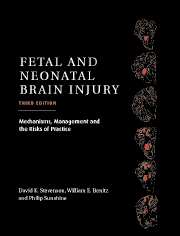Book contents
- Frontmatter
- Contents
- List of contributors
- Foreword
- Preface
- Part I Epidemiology, Pathophysiology, and Pathogenesis of Fetal and Neonatal Brain Injury
- Part II Pregnancy, Labor, and Delivery Complications Causing Brain Injury
- Part III Diagnosis of the Infant with Asphyxia
- Part IV Specific Conditions Associated with Fetal and Neonatal Brain Injury
- 26 Hypoglycemia in the neonate
- 27 Hyperbilirubinemia and kernicterus
- 28 Polycythemia
- 29 Hydrops fetalis
- 30 Acidosis/alkalosis
- 31 Meconium staining and the meconium aspiration syndrome
- 32 Persistent pulmonary hypertension of the newborn
- 33 Pediatric cardiac surgery: relevance to fetal and neonatal brain injury
- Part V Management of the Depressed or Neurologically Dysfunctional Neonate
- Part VI Assessing the Outcome of the Asphyxiated Infant
- Index
- Plate section
33 - Pediatric cardiac surgery: relevance to fetal and neonatal brain injury
from Part IV - Specific Conditions Associated with Fetal and Neonatal Brain Injury
Published online by Cambridge University Press: 10 November 2010
- Frontmatter
- Contents
- List of contributors
- Foreword
- Preface
- Part I Epidemiology, Pathophysiology, and Pathogenesis of Fetal and Neonatal Brain Injury
- Part II Pregnancy, Labor, and Delivery Complications Causing Brain Injury
- Part III Diagnosis of the Infant with Asphyxia
- Part IV Specific Conditions Associated with Fetal and Neonatal Brain Injury
- 26 Hypoglycemia in the neonate
- 27 Hyperbilirubinemia and kernicterus
- 28 Polycythemia
- 29 Hydrops fetalis
- 30 Acidosis/alkalosis
- 31 Meconium staining and the meconium aspiration syndrome
- 32 Persistent pulmonary hypertension of the newborn
- 33 Pediatric cardiac surgery: relevance to fetal and neonatal brain injury
- Part V Management of the Depressed or Neurologically Dysfunctional Neonate
- Part VI Assessing the Outcome of the Asphyxiated Infant
- Index
- Plate section
Summary
Although the morbidity and mortality rates associated with cardiac surgery have drastically declined within the past decade, reduced to 5% in many centers, the concomitant recognition and treatment of significant neurological dysfunction in children have lagged far behind. Neurological dysfunction (either congenital and/or related to perioperative period) remains a serious comorbidity that significantly precludes successful long-term outcomes in children afflicted with congenital heart disease. The mechanisms of injury remain multifactorial with up to 25% of children having residual neurological sequelae postcardiac surgery. This chapter will exclusively deal with the perioperative sources of injury occurring around or at the time of the cardiac intervention.
A deliberate attempt to optimize neurological outcomes using selective cerebral perfusion techniques was initiated by the author in 1996 based upon previous institutional experiences as well as the body of international literature utilizing deep hypothermia and circulatory arrest (DHCA). Selective cerebral perfusion (SCAP) in theory allows for the continuous delivery of blood flow without the concomitant need for profound hypothermia and its deleterious effects on a multitude of organ systems, including the brain. Maintaining an adequate cerebral oxygen supply is a serious problem during aortic arch reconstruction in neonates with conditions such as hypoplastic left heart syndrome, interrupted aortic arch, and others. DHCA remains the most common method used for cerebral protection during cardiac surgery, allowing an extremely limited and a somewhat somewhat ill-defined period of up to 60 min as the maximum “safe” interval.
- Type
- Chapter
- Information
- Fetal and Neonatal Brain InjuryMechanisms, Management and the Risks of Practice, pp. 663 - 670Publisher: Cambridge University PressPrint publication year: 2003
- 1
- Cited by



